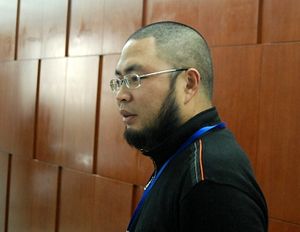Wen Yunchao, more commonly known by his online alias “Bei Feng,” launched a series of online campaigns in support of human rights and Internet free speech in China. He was awarded the French Republic’s Human Rights Prize 2010 by the French National Consultative Commission on Human Rights, in recognition of his efforts and contributions in promoting China’s human rights movements through social media. The Diplomat interviewed Wen about free speech in China, especially on social media and Internet platforms.
You have been a constant proponent for free speech in China, both online and in print. You previously claimed that arrests of dissidents had increased under Xi Jingping’s rule; have things improved since then?
There have been absolutely no improvements. By my count and according to my statistics, more than sixty people were arrested in first three months of 2014, including Ilham Tohti. In three specific cases, 10 people were arrested at a time. Special attention should be paid to cases in Jiansanjian and with the anti-Maoming PX; with those, the government became even more brutal.
You have been on the receiving end of China’s cyber attacks. Do you think it’s largely government driven or just China’s nationalist hackers showing off?
Beginning on June 9th, 2011, my telephone, email account, and Twitter account were simultaneously attacked by an astronomical number of calls, emails, and postings every day. Information about my family, including that of my underage son, was published online. The information about my underage son was never public, only the government could have gotten that. Put simply, it was a huge attack: 5 gigabytes of data per hour poured into my Gmail and more than 590 thousand mentions per day hit my twitter account. The attacks on my Gmail and Twitter accounts stopped on the same day, so I believe Chinese government was behind it.
During the censorship of the Chinese Wikipedia last year, you stated that there is no reasonable “strategy for China.” LinkedIn is testing the waters in much the same way, one of the very few social networking sites in China that is not yet blocked. Why does LinkedIn remain and what can they do to avoid getting axed?
LinkedIn isn’t popular in China, not many people talk about sensitive content on it. Similarly, WhatsApp and Kakao are not yet blocked. But, if the Chinese government ramps up censorship on WeChat and Weibo, Chinese internet users might be forced to move to LinkedIn. Then, the government will block it. In 2009, Fanfou, a service similar to Twitter, was blocked, so users moved to Twitter; then, Twitter was blocked after few days. If that happens, I don’t think there’s anything LinkedIn can do.
You wrote an open letter to Sina investors encouraging them to reduce their shareholdings in Sina on moral grounds. While that didn’t exactly work, Weibo’s own censorship seems to have caused people to move elsewhere. Is there anywhere the Chinese public can go to escape Chinese censorship?
People like money more than justice. I believe crossing the GFW [Great Firewall] is the only way for Chinese people to escape Chinese censorship, but there is no way to escape self-censorship in China.
On that note, WeChat has seen a recent round of deleted public accounts. Do you think WeChat will face the same fate as Weibo?
Absolutely, I have no doubt people used WeChat to encouraged others to oppose the Maoming PX project. I speculate that the government will increase censorship on WeChat.
You’ve said you have no plans to return to your home country. Can you tell us a bit more about your reasons for that?
I played a significant role in many important social movements inside China in the last few years. I’m hesitant to give details, but if I went back to the mainland now, I most certainly would be barred from leaving again, and that means I would lose my freedom completely—house arrest or prison.

































